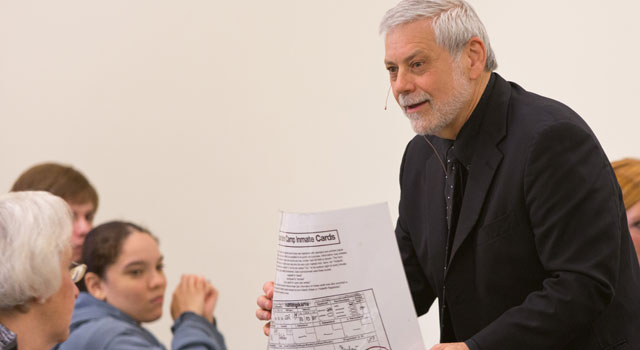Page 123 • (5,797 results in 0.042 seconds)
-

of about 100 people who came to listen to him talk about the years of research, and hundreds of archives searched for his book. “But it would not have the industrial, automated Holocaust,” where each camp had a number, each victim had a tattoo and each victim was researched back through the generations. Black talk was part of the Fall Lecture series under the Kurt Mayer Chair in Holocaust Studies programs. The second lecture will be Nov. 15, when Peter Altmann will present a special viewing of
-
opportunities to inquire into the human condition and the natural world, opportunities for experiential learning, leadership and service, programs that support students physically, emotionally, ethically and intellectually. These programs also promote the university’s Integrative Learning Objectives and the university intent to educate the whole person – body, mind and spirit. In addition to a number of academically based co-curricular programs, many departments sponsor co-curricular education programs and
-
101, SOCI 201, or consent of instructor. (4) SOCI 240 : Social Problems - ES Critical examination of poverty, discrimination, drugs, crime, homelessness, violence, and family breakdown. Course addresses contemporary social problems, an analysis of their social roots, and an evaluation of the policies designed to eradicate them. (4) SOCI 287 : Special Topics in Sociology or Criminal Justice To provide undergraduate students with new, one-time, and developing courses not yet available in the regular
-
significance of race: Anti-Black discrimination in public places. American Sociological Review, 56, 101–116. Settling into campus life Fischer, M. J. (2007). Settling into campus life: Differences in race/ethnicity in college involvement and outcomes. Journal of Higher Education, 78, 125–161. Classroom belonging Goodenow, C. (1993). Classroom belonging among early adolescent students: Relationship to motivation and achievement. Journal of Early Adolescence,13, 21–43. Nine themes in campus racial climates
-
by Douglas Oakman Men and Women Making Friends in Early Modern France edited by Lewis C. Seifert and Rebecca Wilkin Coming Full Circle: Spirituality and Wellness among Native Communities in the Pacific Northwest by Suzanne Crawford O'brien Family Values and the Rise of the Christian Right by Seth Dowland The Science of Chinese Buddhism: Early Twentieth-Century Engagements by Erik Hammerstrom An Introduction to Christian Environmentalism: Ecology, Virtue, and Ethics by Kathryn D. Blanchard and
-
Renewable Energy Scholarship Posted by: nicolacs / September 6, 2022 September 6, 2022 September marks the beginning of application season for the Renewable Energy Scholarship Foundation. We are now soliciting applications for the scholarships to be given in 2023. Last year we gave twelve $2000 scholarships; this year we anticipate 16 or more. There will be at least one for an early undergraduate (preferable community college), at least one other undergrad scholarship, one for an early grad
-
Application ChecklistApplications for graduate admission are processed through an online centralized application service.1. Complete and submit your applicationEach graduate program has its specific application portal where you can fill out and submit your application. The table below provides the direct link to the application portal for each program. ProgramApplication Portal Creative Writing - Master of Fine Arts in Creative Writing Education - Master of Arts in Education Marriage and Family
-
Carlos. About 15 minutes ago, an aide invited the eighth-grader to go for a walk with her around the track to burn off some energy. That lasted about two minutes. For Carlos, who is finishing up his time at Cascade in special education, sometimes it’s like that. Sometimes it’s take a stroll. Other times it’s hide-and-seek. Lee’s frustration sparks through his brown eyes. He honestly doesn’t know what’s to become of Carlos when he leaves Cascade. His family is homeless now, living in a hotel. Carlos
-
, that’s what having PLU Music Ed can do for your resume. Now I am teaching beginning (and very early) band and every opportunity I was given through trumpet lessons, brass lab, and band methods, I use every day. In any given day I will play clarinet, trumpet, baritone, trombone, and tuba for my students. My time at PLU really helped me to feel confident in my abilities in front of a group as well as flexibility to meet students where they are at.” — Mary Davis, Music Education, Class of 2010
-
. Certain kinds of research are never eligible for exemption (i.e., FDA-related research and incarcerated persons). The six categories of exempt research include:Category 1: Normal Educational Practices & SettingsResearch conducted in established or commonly accepted educational settings, involving normal educational practices, such as (i) research on regular and special education instructional strategies, or (ii) research on the effectiveness of or the comparison among instructional techniques
Do you have any feedback for us? If so, feel free to use our Feedback Form.


